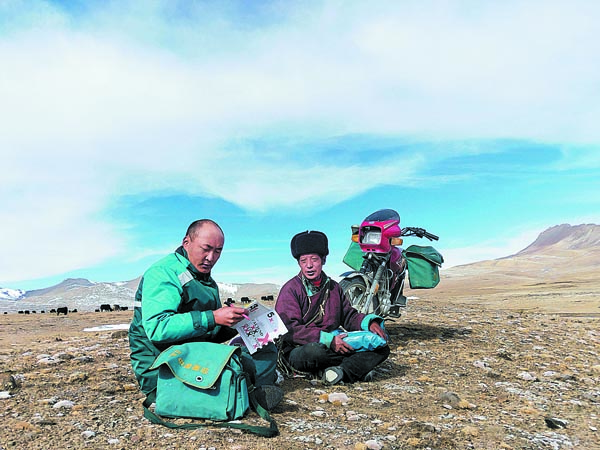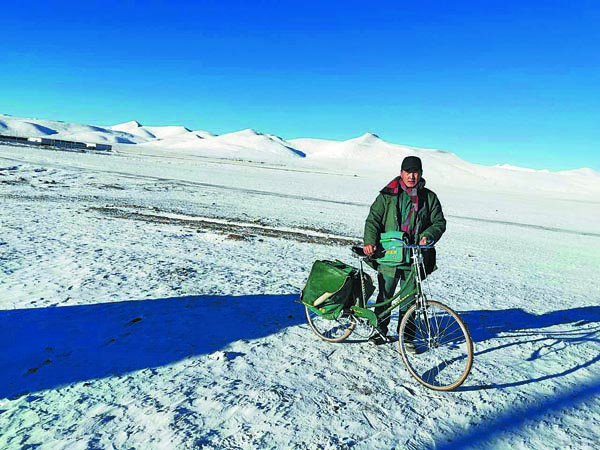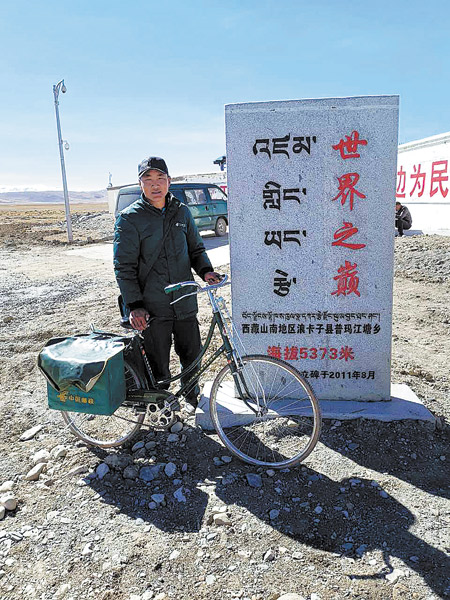Nomads, you've got mail
Updated: 2022-07-13 (China Daily)  Print
Print 



Tsering Chopa (left) has been devoted to the delivery of mail for 17 years in Pumachangthang, the country's highest township in the Tibet autonomous region. [Photo provided to China Daily]
A Tibetan postman's dogged perseverance has bridged the huge gap between China's highest township of Pumachangthang and the outside world, Palden Nyima reports in Lhasa.
Rain or shine, Tsering Chopa drives a truck, steers a motorbike, pedals hard, rides a horse and treks for long hours to deliver good news-and sometimes bad. For 17 years, the Tibetan mailman has been an indispensable link between a remote, high-altitude settlement and the rest of the world.
At 5,373 meters above sea level, Pumachangthang in Nakarze county of the Tibet autonomous region is China's highest township. The oxygen level is less than 40 percent, the annual average temperature -7 C and the average life expectancy only 49.5 years.
As if the dizzying altitude and the bone-numbing weather weren't challenging enough for a postal service, Pumachangthang is inhabited by nomads, who travel across the grassland at least a few times a year to ensure their livestock get enough grazing ground. In other words, they have no permanent address.
The area of the township is about 1,500 square kilometers, almost the size of Mexico City, but its population is less than 2,000. The distance from the county town is some 70 km and a single trip to all the six villages, covered by the China Post service, can be as long as 160 km. The dogged perseverance required to get a delivery job done under such conditions needs no elucidation.

Riding across snow-covered wilderness is part of Tsering Chopa's daily routine. [Photo provided to China Daily]
In 2005, Tsering Chopa gave up herding and became the first mailman of his hometown. Before him, the nomads seldom sent or received mail, remaining essentially disconnected from the outside world. The area was not covered by telecommunication networks until recent years.
In nearly two decades since his first mission, he has delivered over a million newspapers, more than 20,000 letters and 10,000-plus parcels in Pumachangthang, and has never been accused of failing or mixing up mail.
"The key to my success is patience. I carefully check every address at least a few times before sorting them village-wise into different bags. The routine ensures a fail-safe delivery system," says Tsering Chopa, 36.
Between July and August every year, students of the township wait for their admission letters from various academic institutions. It is understandably the busiest time for him.
He recalls a particular incident when he had to deliver mail from the medical school of Sichuan University to the township's Sharso village.
The family had moved, and he had to quiz neighbors several times to find the new address. It was summer and the usual road to the village was blocked because of rain. He trekked for more than 20 km, scaled 6,000 meters and grappled with shortness of breath to finally deliver the letter.
"When the weather is fine, it takes me three hours to get there. That day, it took me more than seven hours. I don't mind the hardships because it is not easy for students from remote villages to get college admission. It was my duty to deliver the mail on time," he says.
After handing over the admission letter to the family, he had to stay overnight in the village before he could return to his post and begin another grueling day.

Tsering Chopa poses in front of a marker confirming the altitude of Pumachangthang township. [Photo provided to China Daily]
Besides being the bearer of urgent news in the remote grassland, Tsering Chopa has also saved lives. One night in February 2019, his dinner was interrupted by a phone call from Nyima Tsering, a resident of Sakhung village. Nyima Tsering's daughter had fainted and he desperately needed help.
Tsering Chopa rushed to Sakhung without hesitation. When he reached there, the girl was still unconscious. The mailman arranged for a car right away and sent her to the county hospital. That was not all. He also gave some cash to the family for her treatment.
Nyima Tsering's daughter recovered soon, and Tsering Chopa became an idol in the village. "I will never forget his compassion and kindness. He saved my daughter's life," says the grateful father.
A hero without a cape for the nomads of Pumachangthang, Tsering Chopa has been honored by the government several times. In 2019, he received the China Youth May Fourth Medal, becoming the only one from Tibet to win the glory that year.
"Winning a high civilian award is overwhelming. I would like to thank China Post for giving me an opportunity to serve the people," he says.
The China Youth May Fourth Medal is the highest honor for young people in China. "It is an acknowledgment of what I do and a token of encouragement as well," Tsering Chopa says.
Winning laurels was never his goal though. His ideals are lofty. "I want to help more people living in remote areas. I want to bring the world closer to them and take them closer to the world," he adds.








